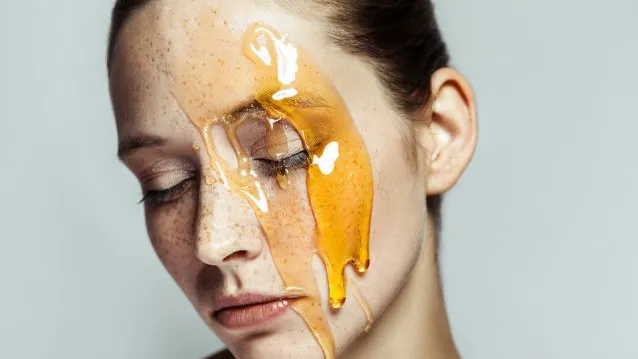When Egypt’s famous pyramids were excavated, archaeologists found pots of honey dating back approximately 3,000 years. Surprisingly, it’s still perfectly edible! Ancient Egyptians revered honey, using it medicinally to treat skin and eye diseases, cover wounds and burns, and of course, to beautify their skin. And, it’s no wonder, since, among other things, honey has antibacterial properties, is full of antioxidants, and boosts collagen production. So, grab that jar of honey! It’s time to discover four surprising ways to use honey on your skin.
Honey does a body good
One of the many reasons people enjoy using natural products, like honey, for medicinal purposes, and in their skin care routine, is because honey is a food-safe skin product. Your skin, after all, is the largest organ on the body, and anything you put on it moves directly into your bloodstream, organs, cells, and DNA. In fact, your skin absorbs a high percentage of what you put on it — about 60 percent. And whatever you put on your skin rapidly absorbs into your bloodstream within less than a minute. Studies from the Centers for Disease Control (CDC) show that absorption of chemicals pass through the skin unnoticed, and may actually be one of the most significant pathways for chemical exposure.
When you compare raw honey to chemically-laden skincare products, honey lessens the chemical burden placed on the body. But it’s not just about chemical exposure. Honey’s amazing natural benefits for the skin include:
- Antibacterial and medicinal properties
- Antioxidants properties
- Natural anti-aging compounds that boost collagen production
- Moisture regulator. Honey is slightly astringent, yet highly moisturizes even the driest skin
- Sebum regulator. Helps regulate the skin’s natural production of oil
- pH regulator. Helps preserve the skin’s acid mantle and regulates the skin’s pH
- Honey naturally soothes and heals wounds and also fades scars
Here’s how your skin can benefit from raw, unfiltered honey…
Use it as a facial cleanser
The thought of slathering your face with sticky honey might seem a little unorthodox. However, honey has some amazing properties. A dermatology study found that honey can soothe the skin and act as a humectant, drawing in moisture. Additionally, it helps keep the skin young-looking, by stopping wrinkle formation. This is likely due to the anti-aging compounds that boost collagen production. Plus, enzymes in the honey work as gentle exfoliators, sloughing off dead skin cells for a radiant complexion.
Here’s how to cleanse your skin with honey
- Remove your makeup, preferably using a natural oil applied to a cotton pad.
- Splash your face with warm water.
- Scoop about a 1/2 tsp of honey into the palm of your hand.
- Massage the honey gently, in a circular motion, around your face and neck. Be careful to avoid your eyes. Raw honey should never be put directly into your eyes.
- Splash your face with warm water to remove the honey. Wash off your hands, neck, and any honey you may have gotten on your arms.
- Follow with a moisturizer of your choice.
Helps control acne-prone skin
Research by the National Institute of Health found that honey’s antibacterial property is the result of an enzyme, which produces low levels of germ-fighting hydrogen peroxide. Therefore, cleansing with honey not only moisturizes and provides anti-aging effects, but it can also naturally open pores to release blackheads, thus healing acne-prone skin, faster. It also regulates skin pH and prevents pathogen infections on the skin surface due to its antimicrobial activity.
Heals wounds
Archeologists excavating ancient Egyptian tombs, found something unexpected amongst the tombs — honey! According to the Smithsonian, it was still edible. The reason why honey remains edible after centuries in a tomb may be, in part, the reason why honey can also heal wounds. Honey, in its natural form, has very little moisture. Few bacteria can survive in an environment like that. So, they die. In fact, they’re actually smothered by it.
The wound healing ability of honey is due to its antibacterial activity, suggests research. It also maintains a moist wound condition and is highly viscous. This provides a protective barrier, which prevents infection. Honey is naturally acidic, having a pH that falls somewhere between three and five. This acidity will kill off almost anything that grows. In addition, honey possesses antimicrobial properties. The antimicrobial activity is due to the enzymatic production of hydrogen peroxide. However, even manuka honey, which is a non-peroxide honey, has significant antibacterial effects despite the fact that the hydrogen peroxide activity is blocked.
Fades scars
Who would have thought honey could fade scars? The antioxidant properties in honey nourish damaged skin, helping reduce the appearance of scars. Use honey as a spot treatment on scars. Massage it into the scar, in a circular motion, every day, until the scar fades.
So, there you have it. Not only can you use honey to sweeten your tea, but you can also use it to sweeten your skin. Grab a jar and give it a try!
-Katherine Marko

